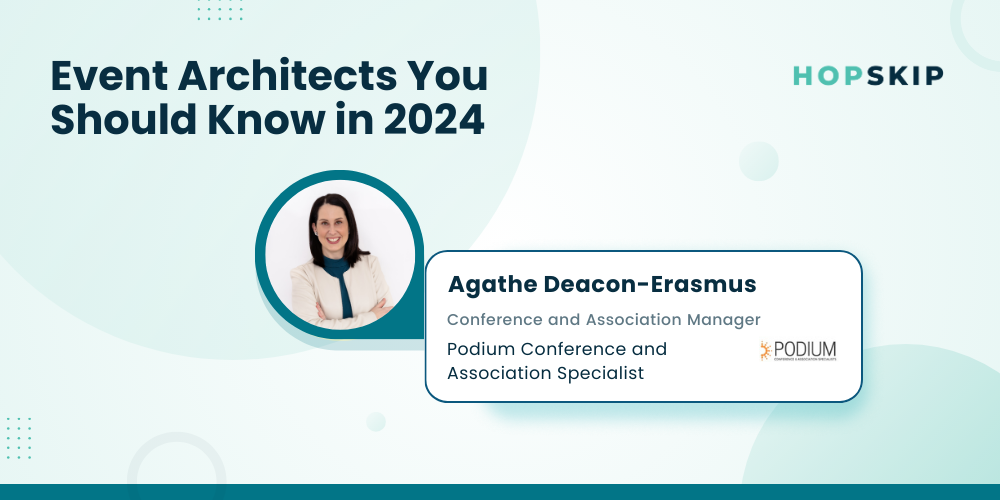Event Architects To Know in 2024 -Agathe Deacon-Erasmus, Senior Events Manager, Multinational Association of Supportive Care in Cancer
Agathe Deacon-Erasmus, Senior Events Manager, Multinational Association of Supportive Care in Cancer, discusses how she builds and plans meetings and events in the evolving hospitality landscape of 2024.
Luke Whalin
Aug 26, 2024

Welcome to the HopSkip Planner Spotlight Series, where we highlight event professionals making waves across the events industry to share lessons learned and raise awareness of their invaluable contributions.
Name: Agathe Deacon-Erasmus
Company Name: Multinational Association of Supportive Care in Cancer
Job Title: Senior Events Manager
Can you briefly tell us about your background in event planning and how you got started in the industry?
I have been in the event industry for 15 years now and got into it straight after university, first with corporate events, then educational events, and later scientific conferences.
How do you go about selecting the perfect hotel or venue? What factors weigh most heavily in your decision?
The event design and the needs of the client/audience are the first aspects I consider, followed by location, availability, accessibility, and how the venue or hotel can accommodate the program’s scope.
What does the initial planning phase of securing a venue look like for you? Could you walk us through your initial steps?
What common financial challenges often arise when organizing an event, what strategies do you use to mitigate them, and how do you avoid them?
It is largely directed by the client’s needs, the design, and the scope of the event. I then consider locations based on aspects such as ease of travel, meeting space to accommodate the program's needs, and sufficient sleeping room for the estimated number of attendees.
Managing expectations with reality can be a challenge. Good negotiations and solid contracts can help. Also, forecasts should be kept updated and reported regularly to the relevant stakeholders.
How do you leverage technology to boost efficiency during the planning, execution, and post-event stages? What does your “event tech stack” look like? (For example, using Survey Monkey for surveying attendees post-event)
Using a platform that seamlessly integrates the management of memberships, conference registrations, and abstract submissions is crucial to the success of a scientific association meeting. Communication tools like my Emma or Mail Chimp for regular newsletters and Survey Monkey for integrated surveys are also very helpful.
Do you use frameworks, templates, or other tools/documents to help you stay organized and manage the event planning process?
Absolutely! I firmly believe in using a well-developed Critical Path and ESG (event specification guide) to help manage my projects and keep them on track. External sharing tools like Google Drive or Share Point are also helpful to keep communication between stakeholders up to date.
Do you have any specific strategies or insights for enhancing the attendee experience at your events?
In my experience, attendees truly seek opportunities to engage at events within the formal program and informally. Especially after COVID-19, there seems to be a higher demand for programs that allow for such engagement and connection “sessions”.
Effective communication is crucial in any planning process. How do you ensure you and your event stakeholders are always on the same page?
Setting regular meetings with different committees and making sure those meetings are well planned and executed to optimize everyone’s time is very convenient and helpful. Using sharing tools to share working documents is also very helpful.
How do you facilitate networking opportunities among attendees? Are there any specific tactics or strategies that you recommend?
What's your go-to plan for handling emergencies or unexpected situations during an event?
Can you share an example of a significant challenge you faced while planning an event conference and how you overcame it?
Create both scheduled and unscheduled engagement opportunities in the program. Also, have quiet spaces for those who need them.
It is important to have an emergency communications plan and emergency procedures plan before any event. Before the event, check with the venue, local authorities, and relevant stakeholders to determine the required procedure in case of emergencies. When an emergency occurs, remain calm and implement these plans as best as possible.
I once managed a large conference at a venue experiencing significant human resource issues and an ongoing strike. To ensure the event's success, we had to adapt our communication with attendees and increase our meetings with the venue. Clear and transparent communication and constant contact between stakeholders were crucial. The event was a great success!
What are the typical steps you take in the post-event phase?
Send your pre-approved survey to attendees, sponsors, and exhibitors to learn about their experience and preferences for future events. Schedule a post-conference debrief with all relevant stakeholders to discuss the event’s successes and challenges. Record all the data and use it to write the final meeting report.
What key performance indicators (KPIs) do you use to evaluate the success of an event?
ROE (Return on Engagement) and ROI (Return on Investment). Use the budget vs. actuals to determine the event's financial success and use the survey results to determine attendees’ satisfaction with the event elements.
What advice would you offer someone just starting their career in the meetings and events industry?
This career can be very challenging but also very rewarding. Don’t be afraid to be yourself and show them what you have to offer this industry. Never stop learning and surround yourself with the best mentors and leaders you can find so that one day you can mentor and lead someone else.